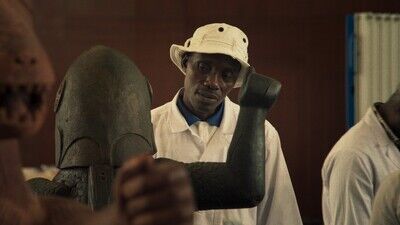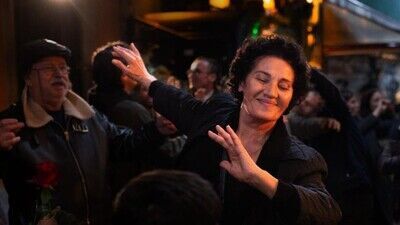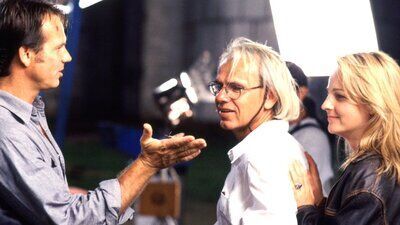The latter consideration is a lens that feels particular to Diop’s desire to give voice to the most disaffected. In this case, it’s item #26 of the artifacts, a King Ghezo statue, who speaks in a low distorted voice about the scarring that occurred when he was ripped away from home. He mostly speaks when the screen is blank and black, a visualization that suggests a lucid accounting of the historical pains, fears, and memories of a diaspora that was stripped of name and country.
Once in Benin, Diop nimbly switches between the perspective of item 26 and the varied responses of the Beniness: in the streets there are vibrant, joyful parades and a sense of reverence, as though a long, lost hero were returning after victory. Once the artifacts are unpacked, then comes a recording of their state. Over the decades parts of them have become damaged or missing, some, with a hint of cruel irony, are cracked at their foundations. Dignitaries come to see the pieces once they’re in place, and so does the public—leading to debate about the return of the artifacts by students at a local university. This sounding board of the young speaking about the political, cultural and historical ramifications of the artifacts — with some decrying that only 26 of the over 7000 looted pieces have been returned — often recalls the fervent debate seen in “The Urban Crisis and the New Militants” series, which captured the radical Black politics happening in Chicago during the late 1960s.
Like that film, what is displayed in “Dahomey” is a country, a people, in fact, who are deciding the world they want to build and what tools they want to build with. Diop finds these scenes just as poetically powerful as the sights of the many who come, with eyes transfixed in awe, to take in the exhibits. “Dahomey” casts a similar spell, soundtracked by a ruminative dreamlike score, it fills and nourishes the viewer with urgent desires, providing space for the light that constitutes the souls of Black folk to shine brighter through repair. Diop is back, and she is just as searing and imperative as ever.
The widowed retired nurse, 70-year old Mahin (Lily Farhadpour), is a lonely woman who spends her days pining for the freedom of a bygone era before the Iranian Revolution. She is looking for romance. But at her age, hampered by a failing knee, commiserating with her friends about their shared ailments while she lives in Tehran, far from her family, where morality police are pulling women over for improperly wearing their hijab or walking too close to a man—how can she find love?

Maryam Moghaddam and Behtash Sanaeeha’s bittersweet two-hander “My Favorite Cake” takes place mostly over a single night. While visiting a pensioners’ restaurant, Mahin overhears a group of older men talking amongst themselves, hoping to protest their country’s broken social order (their struggle for their pensions mirrors the limited avenues for self expression for women). One of the men, Esmail (Esmail Mehrabi), a lonely elderly war veteran now working as a taxi driver, catches her eye to the point of personally requesting his boss that he drive her home. Mahin is tired of not going out dancing, spending nights in solitude watching soap operas until dawn: She wants to live again, and the gentle Esmail is equally game — openly expressing his attraction to a blushing Mahin. The night they spend together is filled with ecstatic drinking, loud reveries, and quiet affection.







Leave feedback about this